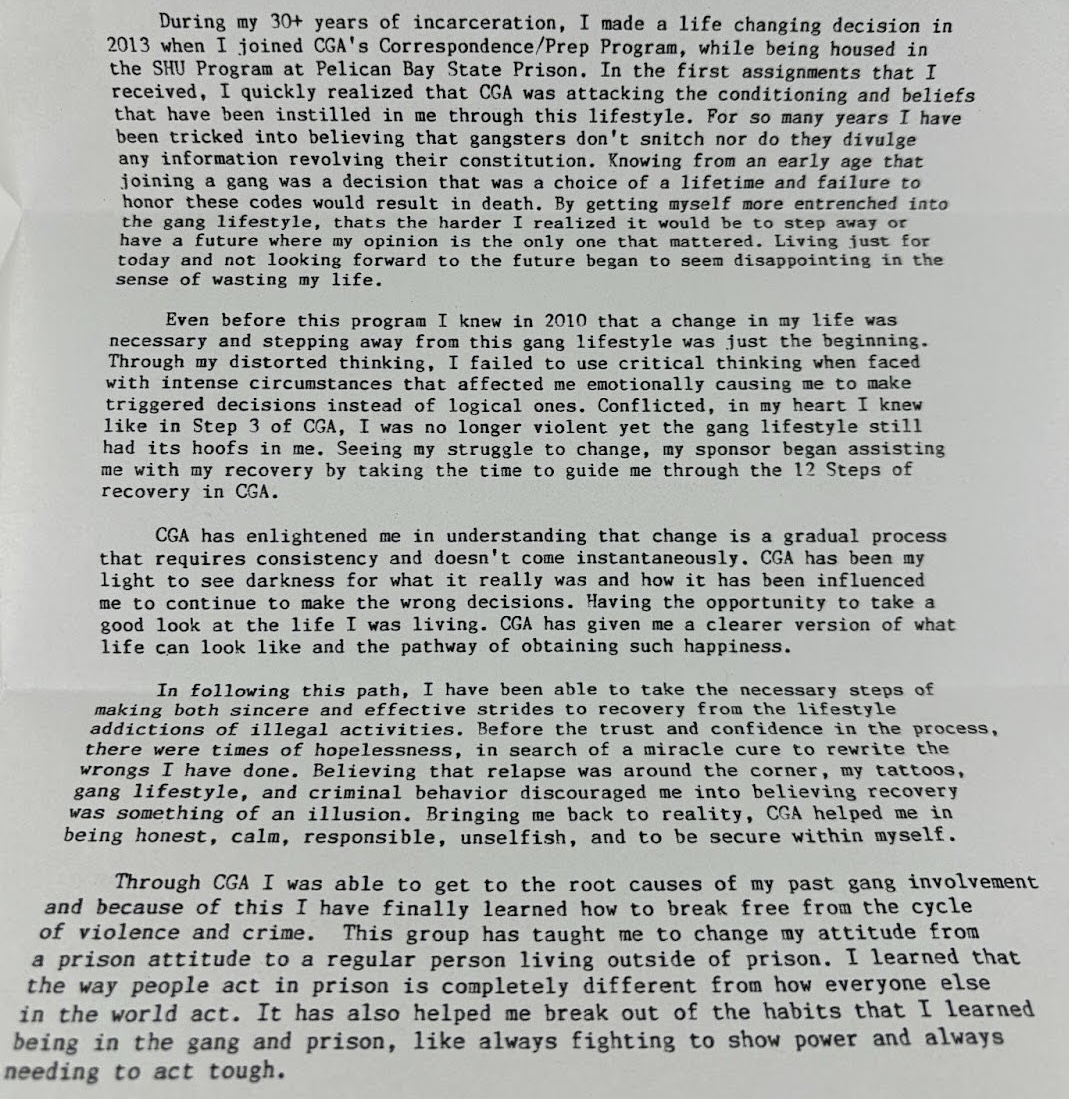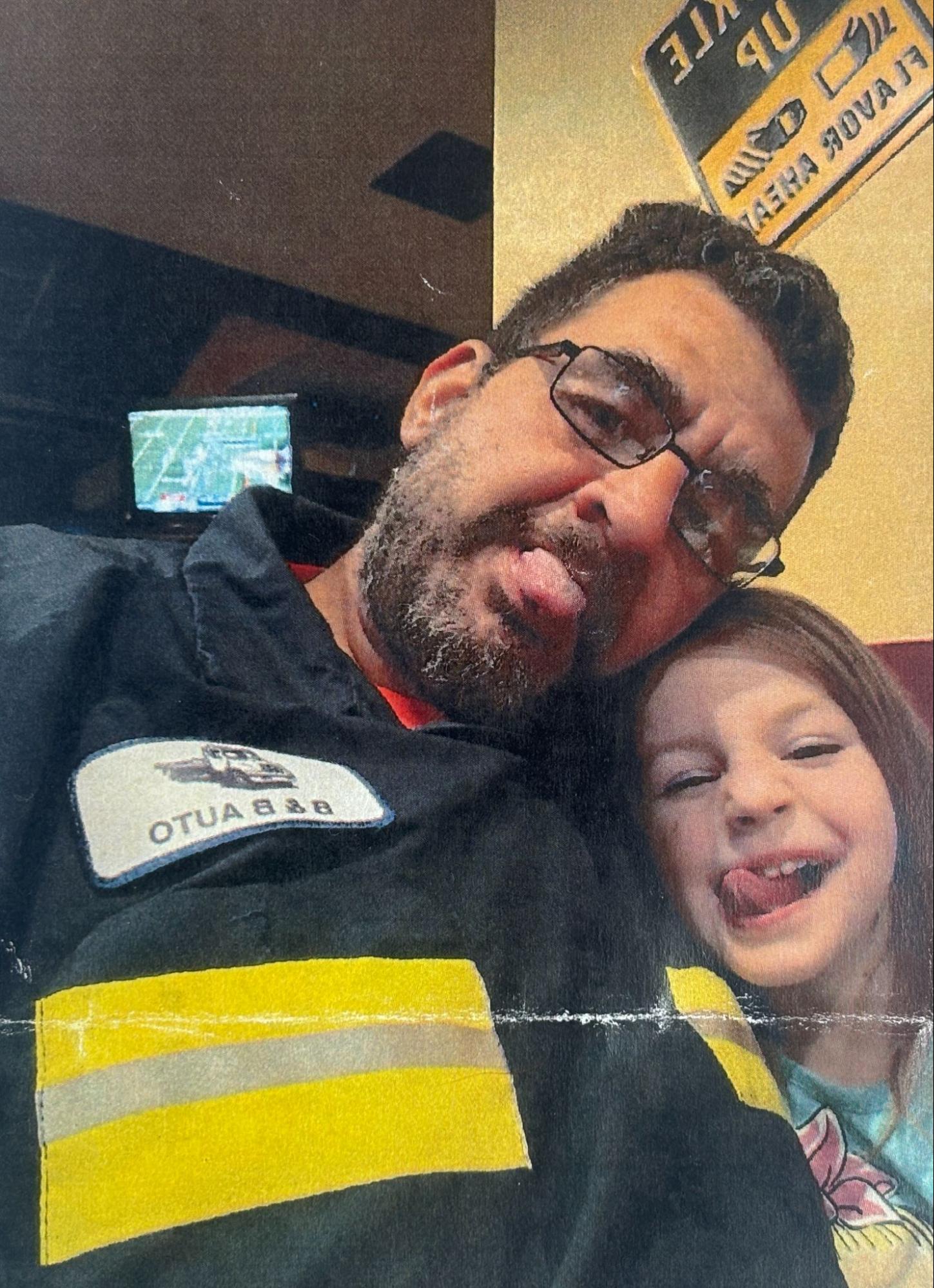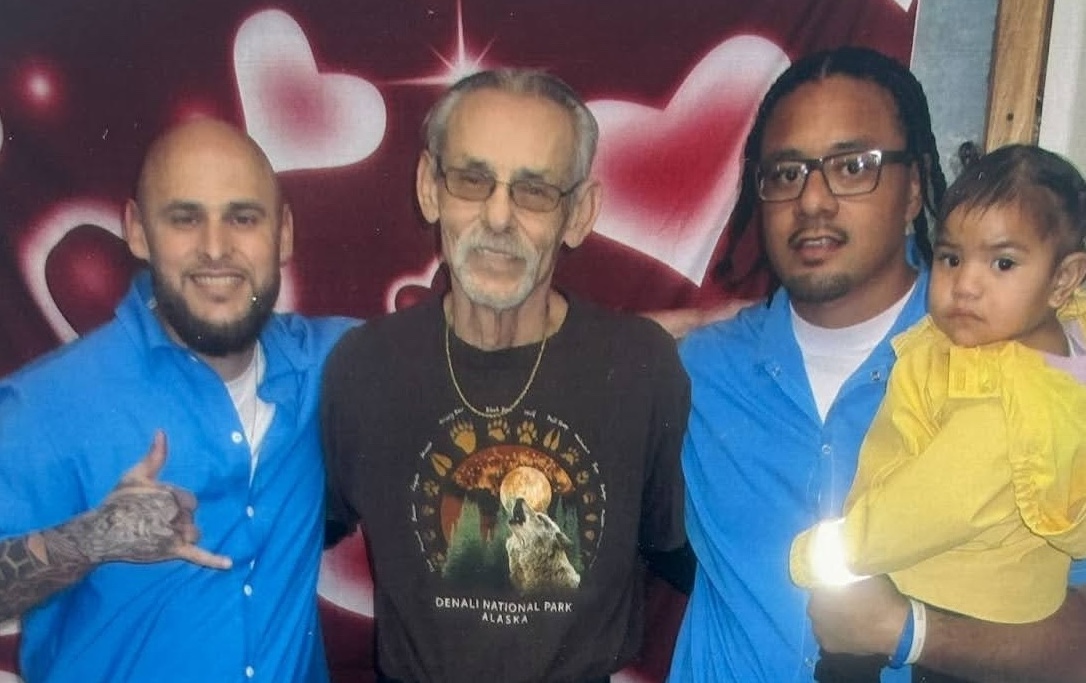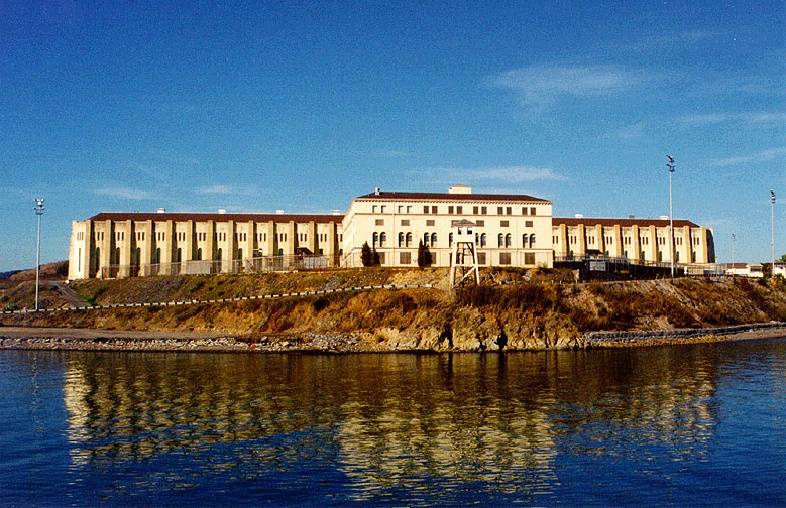Living just for today, without looking ahead, began to feel like I was wasting my life.
Taking the Mask Off
During my 30+ years of incarceration, I made a life-changing decision in 2013 when I joined CGA’s Correspondence/Prep Program while housed in the SHU at Pelican Bay State Prison. From the very first assignments, I quickly realized that CGA was challenging the conditioning and beliefs I had been taught through the gang lifestyle. For so many years, I was tricked into believing that gangsters don’t snitch and never divulge information about their constitution. I knew from an early age that joining a gang was a lifetime commitment, and failure to honor those codes could mean death. The deeper I got into that world, the harder it became to imagine a future where my opinion was the only one that mattered. Living just for today, without looking ahead, began to feel like I was wasting my life.
Even before CGA, I knew in 2010 that change was necessary. Stepping away from the gang lifestyle was only the beginning. My distorted thinking prevented me from using critical thinking when faced with emotionally intense circumstances, which led me to react impulsively rather than logically. Though I no longer considered myself violent, the gang lifestyle still had its hooks in me. Seeing my struggle, my sponsor guided me through the 12 Steps of CGA, helping me along the path of recovery.
CGA taught me that change is a gradual process that requires consistency—it doesn’t happen overnight. The program became my light, showing me the darkness for what it truly was and how it influenced me to continue making destructive choices. With this clarity, I could finally look at my life and see the possibilities of happiness and a future beyond crime.
By following this path, I’ve taken sincere and effective steps toward recovery—not just from illegal activities, but from the addictions tied to that lifestyle. Before I learned to trust the process, I often felt hopeless, searching for a miracle cure to undo the harm I’d caused. I believed that relapse was inevitable and that my tattoos, criminal past, and gang identity made real recovery impossible. But CGA grounded me, teaching me to be honest, calm, responsible, unselfish, and secure within myself.
Through CGA, I confronted the root causes of my past gang involvement and finally learned how to break free from the cycle of violence and crime. The program helped me shift from a prison mentality to one grounded in the real world. I realized that the way people behave in prison is drastically different from how people live outside. I began unlearning the habits I picked up in both gang life and prison, like constantly needing to assert power or act tough.
As a facilitator, I’ve learned to be polite and understanding. I no longer take others’ actions personally or feel the need to “teach a lesson” every time I’m challenged. CGA isn’t just about telling my story, it’s about digging deep, facing my past, and learning to manage my emotions in a healthier way.
Today, I see changes in myself I never thought possible. I now understand that real transformation requires 100% commitment—no shortcuts. It’s all or nothing. I accept that I am a recovering criminal gang member, and I embrace this journey. My transformation is real, and I must continue to walk the CGA path. I now know that my destiny is not just a matter of chance, but of choice. I choose to believe in change. I now have the privilege of defining my own morals, values, thoughts, and feelings. Free from the addictions of gang and criminal life, I finally feel a sense of normalcy and inner peace. This is the process I choose, and it’s one that continues to lead me toward a life filled with untold happiness.
Trauma, Illness, and Healing
There are those who have unwillingly endured the pain of evil, pain forced upon them by people who selfishly poisoned others with their wrongdoings. These victims never asked for the injury or suffering they were subjected to. They were made to experience the blunt force of someone else’s defective character, someone lacking empathy or compassion for their rights, feelings, and freedom. These victims often carry the weight of the question: “Why me?” They hold the pain of injury or loss—often without healing, without amends, without restitution.
Many of them must bear their grief without the ability to regain what was once theirs to love, nurture, or enjoy. Victims come from every background, any age, any status. They are the direct recipients of evil behavior, left scarred in ways that the offender often never sees.
Victims are often filled with questions and few answers. Their pain grows into fear, then anger, which can lie dormant as resentment or depression. And yet, victims can heal, if given the support, understanding, and space to speak openly and honestly. That’s how they release the poison inside and begin to seek forgiveness, closure, and healing.
Look into your heart, into your life… Have you been a victim? Are you still?
How Does the Vicious Cycle Work?
It’s often said: Two wrongs don’t make a right.
When a victim is left with the poison of resentment after a tragic act, it can be difficult to shift their mindset. That pain, if left unresolved, seeps into their relationships, dimming their capacity for compassion. Some become so bitter that they inflict harm on others, intentionally or not.
Evil cannot be healed with more evil. Only love can weaken it.
If we don’t address the pain, the cycle of victimization continues. Anger is passed from one person to the next, unchecked and unresolved. Healing is replaced with retaliation, and suffering grows.
So, how can we heal if we continue to hate? Why should we suffer by holding on to hate, when we have the power to let go and reclaim our future?
When pain is unresolved, it festers. It becomes anger, then resentment, infecting the soul. That resentment can evolve into a mindset that lacks compassion and seeks only to pass on pain.
Think of the child who grows up watching violence, who learns that anger is how problems get solved. That fear equals control. That love is conditional. A child who endures emotional, physical, or sexual abuse may grow into someone who hates themselves, others, and even God, for not stopping the pain. They often become emotionally bankrupt before they hit their teens, acting out the same pain they once received, or worse.
When one person is hurt and seeks only retribution, the cycle continues. One family mourns on one side, another suffers on the other. Pain multiplies. Violence escalates. The dominoes fall.
Because hurt people hurt people.
And healing begins when that cycle is broken.






